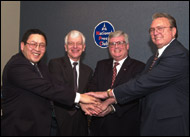

George Mason held a press conference in February to announce the creation of the Center for Biodefense. (From left to right): Ken Alibek, executive director of the center; President Alan Merten; Sterling Phillips, CEO of Hadron, Inc.; and Charles Bailey, deputy director of the center.
Mason Responds to the Challenges of the Biosciences
For some years now, George Mason University has been at the forefront of research in the biosciences, and last fall's terrorist attacks have focused considerable attention on this research.
On the very day letters containing anthrax spores arrived on Capitol Hill, George Mason faculty members from the College of Arts and Sciences were in the Hart Senate Office Building briefing members of Congress and their staffs on issues related to the September 11 attacks.
Maria Dakake, assistant professor of religious studies, gave an overview of Islamic belief and history; Peter Mandaville, assistant professor of government and politics, provided insight into al Qaeda and the Taliban; and Priscilla Regan, associate professor of government and politics, spoke on balancing information security and privacy. On the bioscience front, Kenneth Alibek, distinguished professor of medical microbiology and immunology, briefed the gathering on the status of bioterrorist threats and the United States' ability to respond.
In the past several years, bioscience has emerged as an increasingly complex and interdisciplinary subject that cannot be approached within the confines of a single discipline. In addition to the customary interaction among chemistry, physics, and biology, mathematics and data analysis have become increasingly important in solving complex problems in the life sciences. New technologies have revolutionized the way data are collected, stored, retrieved, and analyzed, enabling researchers to cross boundaries to develop new knowledge to benefit the region and the nation. George Mason is meeting the challenges this field presents on several fronts.
To train students to be research scientists with careers in private industry and academia, George Mason has created a new Ph.D. in Biosciences program, which was approved by the State Council of Higher Education for Virginia last fall. The program, with concentrations in neuroscience, genomics and biotechnology, systematics and evolutionary biology, astrobiology, and bioethics, will welcome its first students in fall 2002. Key features include an interdisciplinary approach that combines the strengths of 11 departments, two colleges, and the Krasnow Institute; a strong emphasis on the latest technology and computational approaches; and modern research facilities housed primarily at the Prince William Campus.
The program is designed to build on changes occurring in the field and will capitalize on strong partnerships in the Washington metropolitan area. Students will receive crucial interactions with private biotechnology companies; federal laboratories, including the Naval Research Lab; and Inova Health Systems.
To address issues related to the threats biological terrorism and biological weapons proliferation poses to national and international security, George Mason recently created the Center for Biodefense. Dedicated to focused biodefense research, education, and training, the center is directed by Alibek and Charles Bailey, distinguished professor of biology. Alibek, who served as first deputy chief of the civilian branch of the former Soviet Union's offensive biological weapons program, has more than 20 years of experience in development, management, and supervision of high-containment pathogen laboratories. After defecting to the United States in 1992, Alibek served as a consultant to numerous U.S. government agencies. Bailey spent 25 years in research and development and managerial roles for the U.S. Army in the field of infectious diseases and biological warfare defense.
By increasing awareness of medical and public health issues raised by the threat of biological weapons and by acting as a training ground for medical and scientific personnel specializing in infectious diseases, the Center for Biodefense is one more way George Mason serves a critical need for the region and the nation.